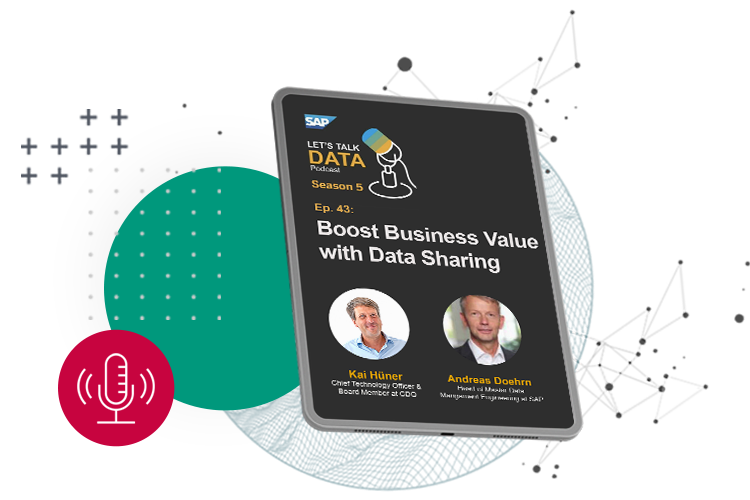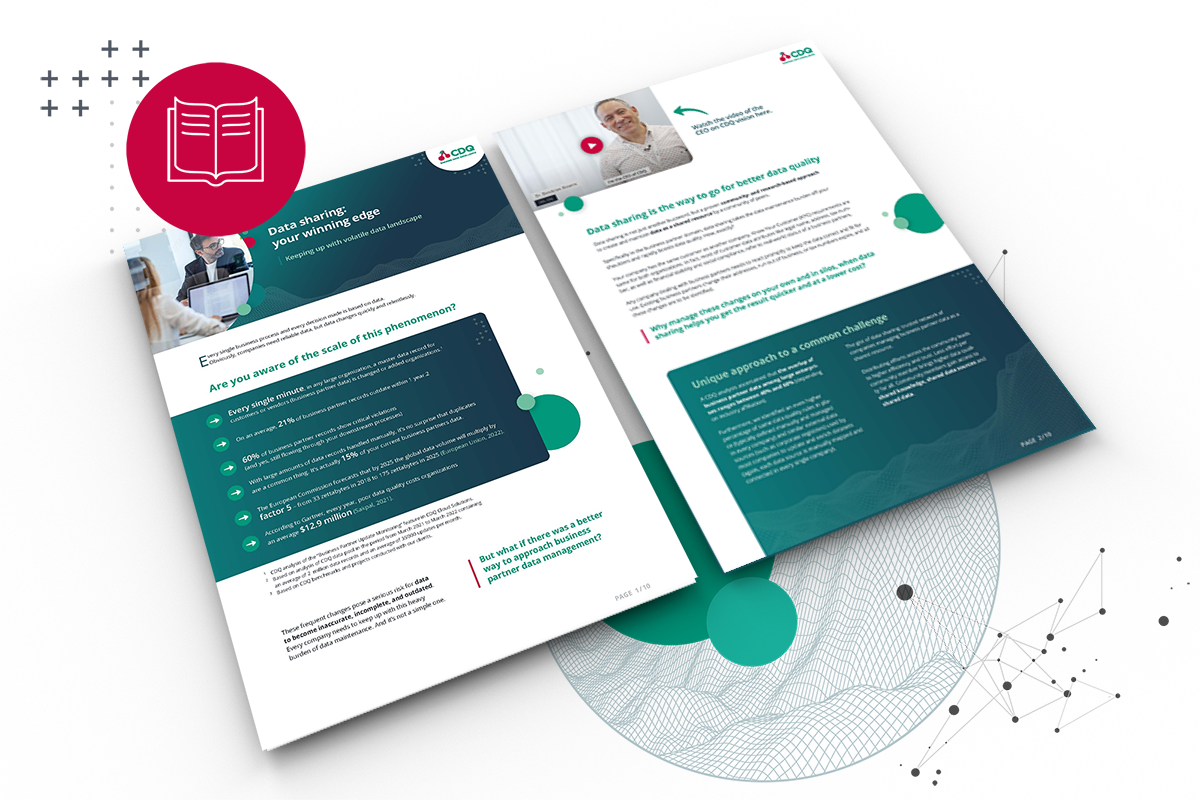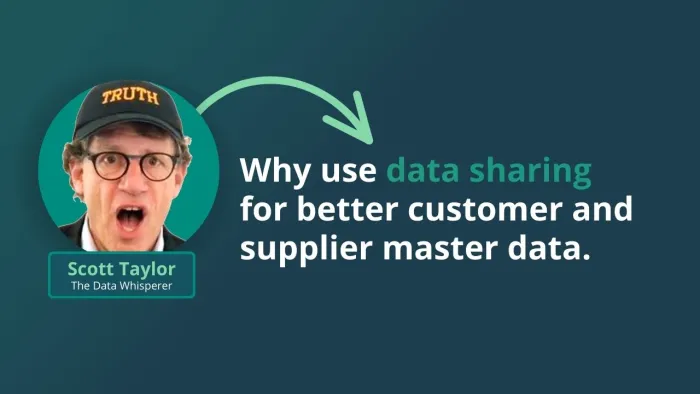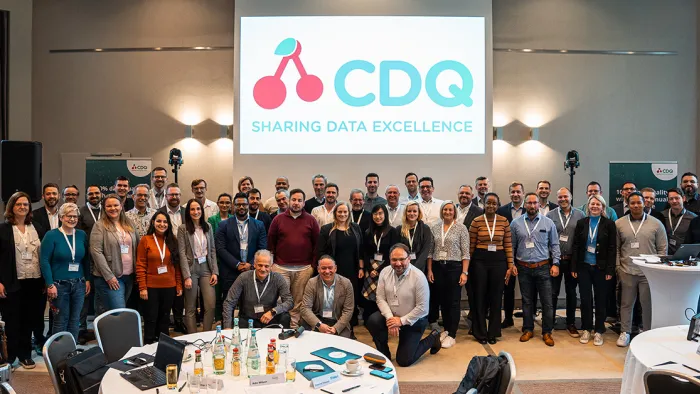Data Sharing
The most effective and innovative way to customer and supplier data creation and maintenance.
Why Data Sharing?
Most of customer and supplier data attributes like legal name, address, tax number, as well as financial stability and social compliance, refer to real-world status of a business partner. As such, existing business partners change their addresses, run out of business, or tax numbers expire.
By jointly managing the overlapping master data, data quality rules and data sources, companies significantly reduce their efforts and costs to keep their business partners up to date, and, at the same time, improve data quality.
So, why work harder and pay more when data sharing can help you work smarter and achieve more for less?
How do you deal with burden of data maintenance?
Benefits of Business Partner Data Sharing
What happens when you share Business Partner data?
Let's Talk Data podcast from SAP
Companies that succeed at data sharing can get more value from their data and analytics strategy. Join Kai Hüner, CTO at CDQ, and Andreas Doehrn, Head of Master Data Management Engineering at SAP, as they discuss the concept of data sharing.
- What is data sharing?
- Why is data sharing important?
- What is the business value to achieve with data sharing?
Pick your channel to listen to Data Sharing Podcast:
YouTube | Spotify | Apple Podcast | Google Podcast | Soundcloud

Data Sharing Community
To bring data sharing to life, CDQ initiated the first Data Sharing Community. This community has jointly built up a shared data pool for business partner data. It is the only data pool which does not only cover open data sources, but also records shared directly with the community by members.
Above all, this includes operationally:
- Updates on business partner records
- Ready-to-use data quality rules
- Industry and region-specific data
- Shipping addresses or other non-legal locations
Interested to be a part of the community? Get in touch now!
Watch more data sharing examples
Data Sharing with CDQ in a nutschell
in CDQ shared data pool
within a trusted network
overlap between enterprises*
Your competitive edge: Data Sharing
Data sharing is a proven community- and research-based approach to create and maintain data as a shared resource by a community of peers.
Sharing customer/vendor and supplier master data will lift much of the maintenance burden off your shoulders and rapidly boosts data quality.
How, exactly? Discover in this free eBook!

Data Sharing on CDQ Blog
Power of community: become a data hero too!
Twice a year the CDQ Data Sharing Community gathers for a 2-day onsite workshop to discuss all things master data in quite a unique format. During the event,…
Data Mesh and the case of Data Sharing
Fueled by the increasing demand for distributed, scalable, and agile data platforms that can enable
Trust in shared data: quantifying the benefits of Data Sharing
Some call this approach 'Interenterprise MDM', some call it 'Collaborative Master Data Management', but the benefits of data sharing go beyond names. CDQ is the…
Data Sharing Frequently Asked Questions
How does CDQ enable data sharing?
CDQ Data Sharing platform provides various services for the creation and validation of data records as well as workflows for updating the data. It includes the shared technical data model with quality rules and enrichment with external data sources, and is designed for sharing of customer and supplier data records between the companies in the network.
How does data sharing look in day-to-day business?
Upon creation, companies can use a search function to determine whether a corresponding record for a business partner already exists, i.e. whether another company already maintains this data record or if at least external reference data is available. As soon as one of the companies is informed by a business partner about changes to the data, it triggers a workflow to update the data record.
What is data sharing, and why is it essential for modern businesses?
Data sharing involves the exchange of information between different entities or systems. In business, it facilitates collaboration, informed decision-making, and innovation. It enables organizations to leverage diverse data sources for better insights and operational efficiency.
How can businesses ensure the data they share is considered trusted data?
Trusted data is reliable, accurate, and consistent. To ensure data is trusted, businesses should establish data governance frameworks, implement quality controls, validate sources, and employ data management tools to maintain data integrity throughout its lifecycle.
What is business partner master data, and why is it crucial for organizations?
Business partner master data comprises comprehensive, accurate, and standardized information about entities with whom a company conducts business, including customers, suppliers, and vendors. It's crucial as it forms the foundation for operational transactions, strategic decision-making, and maintaining effective relationships.
How can companies maintain the quality of their business partner master data in a shared environment?
Companies can maintain the quality of business partner master data by implementing data stewardship programs, employing data quality checks and validation processes, establishing clear data ownership, and fostering a culture of data responsibility among stakeholders involved in data sharing.
How secure is data sharing within the community?
The anonymity of the companies is maintained and a dual control principle (i.e. a review by a second company) ensures the high quality of and trust in the data provided. The (positive) experiences have already led to extended data sharing scenarios, such as the sharing of trust scores based on transaction data, which enables fraud cases to be detected earlier and therefore more efficiently.
What are the security considerations when engaging in business partner master data sharing?
Security is paramount when sharing business partner master data. Implementing robust encryption methods, access controls, data anonymization where applicable, compliance with data protection regulations, and contractual agreements outlining data usage and protection measures are essential for secure data sharing practices.




